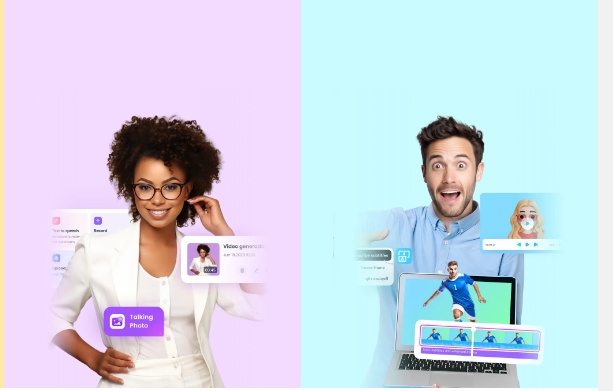In the ever-evolving landscape of technology, real-time voice cloning apps have emerged as more than just a source of entertainment. Beyond the realms of fun and mimicry, these applications harbour a wealth of practical applications that extend into professional settings, accessibility enhancement, and aiding individuals facing speech-related challenges. In this blog post, we'll explore the diverse and practical uses of real time voice cloning apps, shedding light on their transformative potential.
1. Voiceovers and Media Production:
Real-time voice cloning technology has found a significant foothold in the realm of media production, offering an unprecedented level of creativity and efficiency. Voiceovers, an integral part of animations, advertisements, audiobooks, and various audiovisual content, can leverage the versatility and precision that these apps provide. Content creators now can streamline the production process, saving valuable time and resources. The technology enables experimentation with different voices, allowing for a more nuanced and tailored approach to character development. With real-time voice cloning, content creators can ensure a consistent, high-quality, and polished output, enhancing the overall impact and resonance of their audiovisual creations.
2. Accessibility Features:
One of the most promising applications of real-time voice cloning lies in the realm of accessibility. Individuals with speech impediments, vocal disorders, or those who have lost their ability to speak due to medical conditions can leverage these apps to regain a voice that suits their preferences. Customizable voices can provide a sense of identity and empowerment, fostering improved communication and inclusivity.
3. Enhancing Communication for Speech-Related Challenges:
Real time voice cloning apps are becoming valuable tools for individuals facing speech-related challenges. Those with conditions such as stuttering, apraxia, or even social anxiety can use these applications to practice and refine their speech in a comfortable and controlled environment. The ability to experiment with different voices can boost confidence and aid in overcoming communication hurdles.
4. Multilingual Communication:
In an era characterized by increasing global interconnectedness, real-time voice cloning apps emerge as indispensable tools for fostering seamless multilingual communication. These applications enable users to converse in their native language while the app generates a cloned voice in another language, breaking down linguistic barriers and facilitating more effective cross-cultural communication. The implications of this feature extend across various domains, including international business negotiations where clear communication is paramount, diplomatic engagements that require linguistic diplomacy, and language learning scenarios that benefit from practical, real-world conversational experiences. Real-time voice cloning technology thus serves as a bridge, connecting individuals from diverse linguistic backgrounds and fostering a more inclusive and globally connected world.
5. Assistive Technology for the Elderly:
For the elderly population, especially those facing age-related vocal changes, real time voice cloning apps can serve as assistive technology. Customizable voices that sound familiar and natural can enhance communication with loved ones and caregivers. These apps can provide a supportive tool for maintaining social connections and mitigating the challenges associated with age-related vocal changes.
6. Improving Language Learning and Pronunciation:
Real-time voice cloning apps represent a transformative asset for language learners seeking to elevate their proficiency. These applications, functioning as invaluable tools, mimic native speakers or offer detailed feedback on pronunciation, providing users with a nuanced and effective language acquisition experience. The ability to practice conversational skills with cloned voices fosters a dynamic and immersive learning environment, catering to diverse learning styles. This feature proves particularly beneficial for self-directed learners, allowing them to tailor their language learning journey to their unique needs and preferences. Additionally, individuals aspiring to master nuanced accents and dialects can leverage these apps for targeted and personalized language practice, bringing a new dimension to the pursuit of linguistic fluency.
7. Virtual Assistant Customization:
In the era of virtual assistants, real-time voice cloning adds a layer of personalization. Users can customize the voice of their virtual assistants to better align with their preferences, creating a more enjoyable and relatable interaction. This not only improves user experience but also establishes a stronger connection between technology and its users, making virtual assistants feel more like personalized companions.
8. Training and Simulation for Professionals:
Professionals in various fields, such as customer service representatives, actors, or public speakers, can utilize real time voice cloning apps for training and simulations. By simulating diverse scenarios and responses, individuals can refine their communication skills, adapt to different audience types, and enhance their overall performance in a controlled and immersive environment.
9. Creating Interactive Educational Content:
Real-time voice cloning can revolutionize educational content creation. Teachers and content creators can use these apps to generate engaging and interactive lessons. The ability to integrate different voices and characters into educational materials adds an entertaining dimension to learning, making complex concepts more accessible and enjoyable for students of all ages.
10. Innovations in Gaming and Virtual Reality:
As the gaming industry continues to push the boundaries of realism and immersion, real-time voice cloning apps find applications in gaming and virtual reality experiences. Game developers can use this technology to create lifelike characters with unique voices, providing players with a more immersive and captivating gaming experience. Additionally, virtual reality simulations can benefit from realistic and customizable voices for enhanced user engagement.
Conclusion:
The practical uses of real-time voice cloning apps extend far beyond what meets the eye. From language learning to virtual assistant customization and professional training, the versatility of this technology continues to expand. As developers and innovators explore new possibilities, we can anticipate even more groundbreaking applications that will redefine the way we communicate, learn, and interact with technology in the years to come. Real-time voice cloning apps are not just about imitation; they represent a dynamic force driving positive change across various aspects of our personal and professional lives.


No comments yet